- Home
- stock market
- 10 'grey swan' events to watch out for in 2017
10 'grey swan' events to watch out for in 2017
Shock 1: 'US productivity boom'

Shock 2: 'China floats currency'
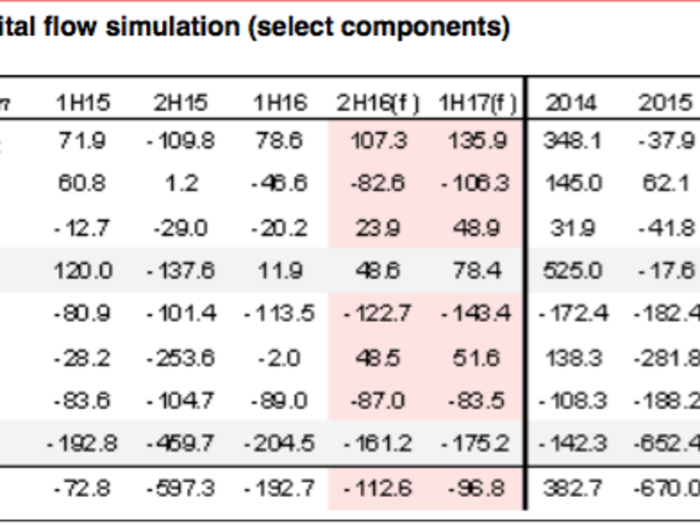
The idea of China shifting to a floating currency in the near term is pretty low, and the current path of periodic FX flexibility combined with intervention is likely to continue over the next 12 months, according to Nomura Asia FX strategist Craig Chan.
However, China's long-term goal is to move towards a free float, and in a grey swan event, it could happen sooner than expected with far reaching effects.
If China were to suddenly adopt a free-floating FX regime and no longer intervene, the team believes the RMB would depreciate rapidly, leading to a sell-off in local markets and causing negative regional and global market contagion.
"The risk of China shifting to a free float could lead to a severe balance of payments shock with serious negative economic/financial market consequences." writes Chan.
Shock 3: 'EU reforms, UK rejoins'
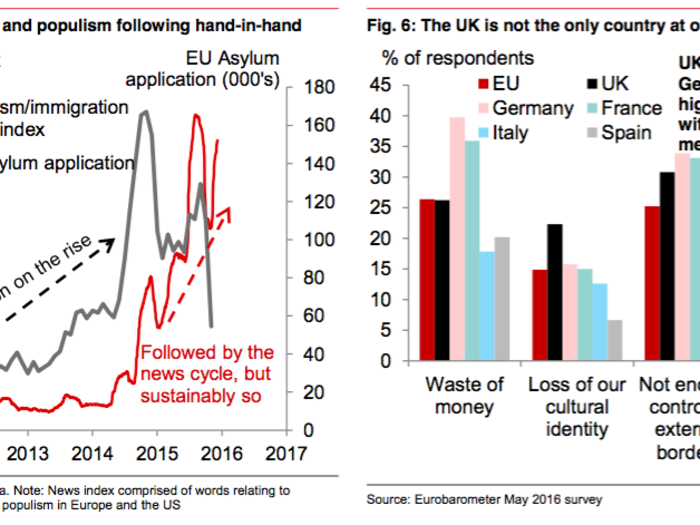
2016 was the year politics "stumped the consensus" according to FX strategists Jordan Rochester and Anna Titavera, so why couldn't 2017 do the same? With Brexit, a Trump victory and the Italian referendum, in politics, "one cannot rule anything out." This includes a grey swan scenario in which the EU as a whole reforms and the UK rejoins.
The team identify two ways in which this could happen. A UK-led movement to actually unwind the Brexit decision and rally around a single market access agenda, or an EU led one, in which the EU offers the reforms the UK has been asking for all along, including redefining the free movement of labor. According to the report, This could come as the EU attempts to limit the growing anti-EU sentiment in the euro area in a year of major elections across Europe.
Shock 4: 'Japan inflation surge'
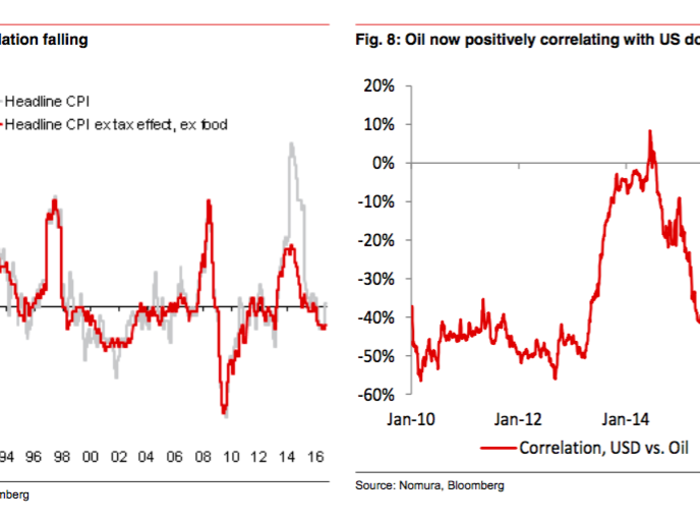
Japan has an inflation problem. The latest print for headline inflation was only 0.1% and core inflation at 0.2%. For the year ahead, consensus expects a slight pick-up to 0.5% while Nomura economists expect this to be lower at 0.3%.
But, Nomura FX strategists Andy Chaytor and Anne Karina Asbjorn question, what if we are all wrong and Japan instead experiences a sharp pick-up in inflation?
In their opinion, the most plausible way for this to happen would be through the interplay between USD/JPY and oil prices. Up until recently, there has been a negative correlation between the dollar and oil, so when oil prices were falling, the yen was also weakening and vice versa. This resulted in the deflationary impulse of lower oil prices being offset by the inflationary impulse of a weak yen. Now, this correlation between oil and USD has started to weaken and could even flip "so that higher oil prices and a weaker yen happen concurrently."
This has indeed happened since Trump's election victory. "We think this would then result in both oil and and yen providing inflationary impulses, which could provide a "big surprise for 2017."
Shock 5: 'Fed muzzled'
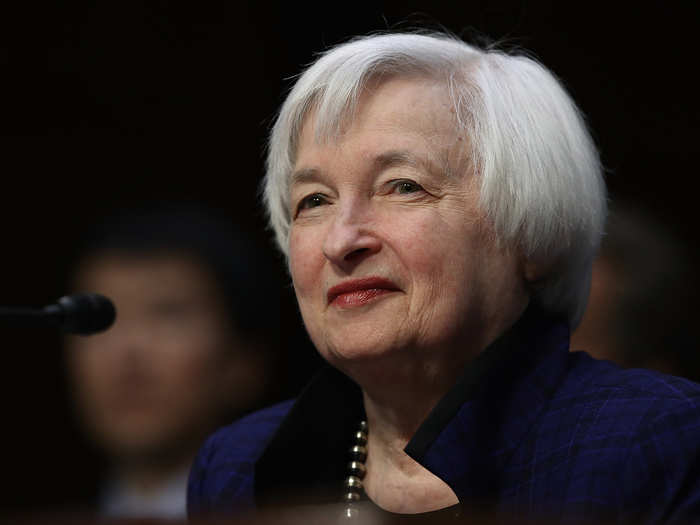
President elect Trump was outspokenly critical of the Federal Reserve and Janet Yellen throughout his campaign, arguing that interest rates should be higher and that the Fed balance sheet should de reduced. While he has tempered his tone since being elected, he could still try to change the way the Fed operates, according to Nomura economist Charles St-Arnaud.
He has been vocal about the potential of requiring more scrutiny in the form of an audit of Federal Reserve activity, greater supervision from Congress, and about altering the Fed's mandate in terms of inflation targeting that includes asset prices (like house prices).
He also spoke about creating "Taylor-rule" based rate decisions, where policy rates are automatically adjusted to changes in the determinants of the rule (eliminating any discretion in monetary policy and making it more predictable), and a return to a gold standard or rule-based supply of money, thereby preventing bubbles and containing inflation.
With currently two vacancies on the Federal Reserve board, Trump will be able to name board members with similar views. With Chair Yellen and Vice-Chair Fischer's term expiring in 2018, it is the President's decision (with Senate confirmation) as to who of the current sitting board members is nominated chair and vice-chair. There is also the risk that any changes in the Fed's mandate could lead to the resignation of current members, according to St-Arnaud, allowing Trump to name more like-minded governors.
Shock 6: 'Russia flexes it muscles'
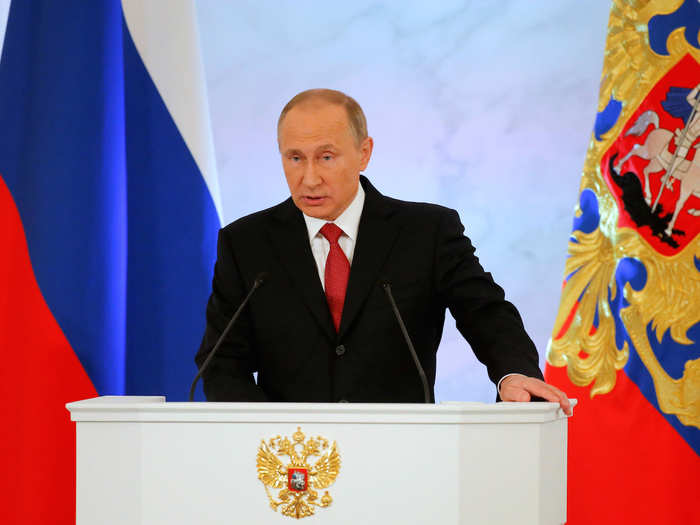
While Nomura EEMEA research analyst Peter Attard Montalto confirms that it is not Nomura's baseline that Russia will undertake any military engagement against Eastern Europe in 2017, is it a question investors are asking and could be a grey swan event.
There is recent precedent in Georgia in 2008 and Ukraine in 2014. In particular, Montalto sees the plausible forms of Russian aggression to be in the Ukraine and in the Baltics, where countries are already increasing defense expenditure, undergoing training operations, and putting in place emergency procedures.
Shock 7: 'Clearing houses fail'

One major regulatory change affecting how over-the-counter (OTC) derivatives are traded that has been introduced in the aftermath of the financial crisis is the role of central counterparties (CCP). These entities act as intermediaries between counterparties in interest rate swaps and some other derivatives, and are designed to reduce counterparty risk in the system and contagion risk throughout the system when one bank fails. In essence, when two banks enter a bilateral derivative transaction, the CCP steps in and sits in between the two banks, protecting each from the other's counterparty risk.
Although designed to reduce systemic counterparty risk, some argue these entities have instead concentrated all the risk into one place. Although the risk of CCP failure may be small, the implications in that sort of gray swan event would be far reaching and significantly more damaging than the default of a single bank.
Shock 8: 'Japan's Abe loses power'
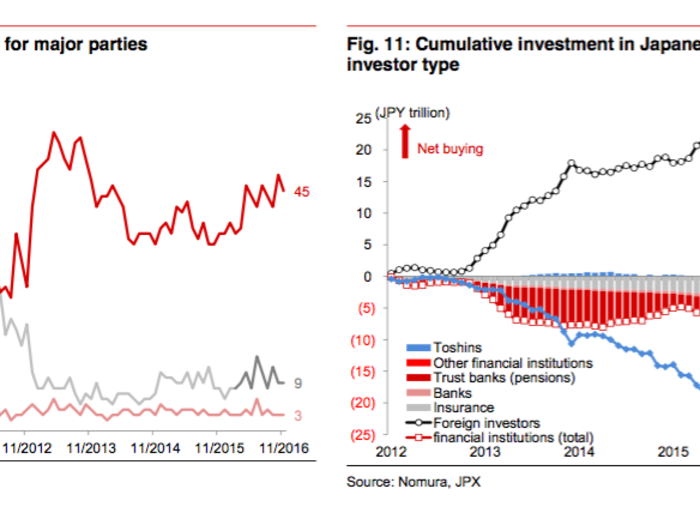
With a general election in Japan expected in 2017, the biggest political shock would be anything that fractures the stability of the current institution, according to global FX strategist Yujiro Goto.
If the four main opposition parties nominate joint candidates, which is currently being discussed, Abe's Liberal Democratic Party could lose its solo majority in the lower house and the super majority. Abe's position would be substantially weakened and the most extreme outcome could be his resignation or a regime change to the cabinet, writes Goto.
If this grey swan event were to happen, Abenomics trades would be unwound and Japanese equities would bear the fall. Moreover, the dilemma for the Bank of Japan would be compounded with an Abe resignation, leading to uncertainty over BOJ Governor Kuroda's successor after his terms ends in 2018.
Shock 9: 'EM capital controls return'
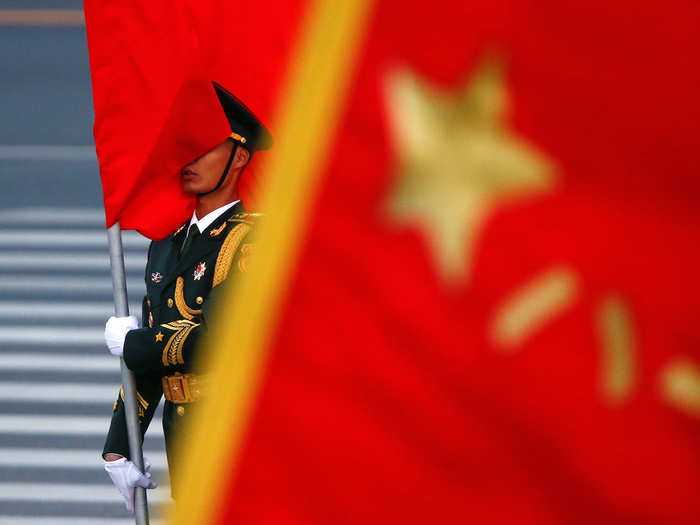
In the "Trumpflation" world of higher US yields and a stronger dollar, emerging markets may face even more pronounced outflows than in 2016, according to Nomura strategists Peter Attard Montalto and Inan Demir in the report. Were this to happen, "we may see concerted action by EM policy makers for the first time."
If some countries are implementing capital controls as part of a currency war strategy, it could lead to a "deflection of flows" with investors exiting the countries that they can. This would only increase the incentives for concerted action among EM policy makers.
"This may well be a theme we see play out in part, though not in full, moving through 2017," according to Monalto and Demir.
Shock 10: 'Paper money disappears'
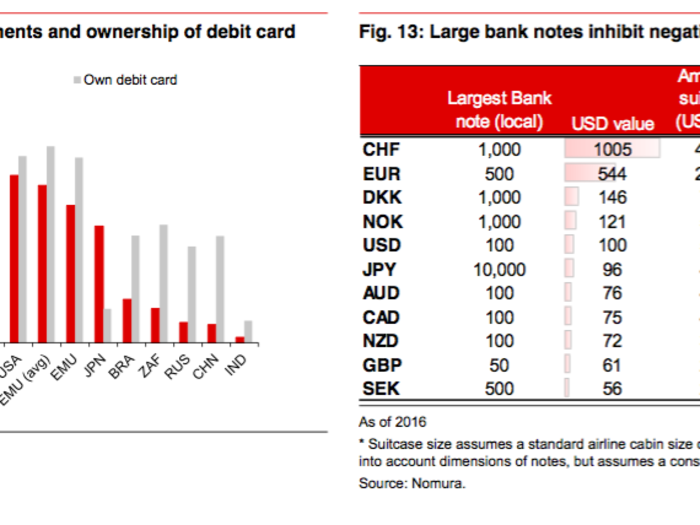
According to global FX strategist Sam Bonney, there are three main arguments for abandoning notes and coins and moving to an electronic money system: to track criminal transactions, a move towards digital payments, and to charge negative rates.
The note argues that developed countries could lead the way to a conversion to a purely electronic money system. Sweden has been discussing the prospect and Japanese banks are coming closer to using blockchain in the payments system.
Although a grey swan event, "It seems we are on the threshold when secure decentralized electronic money and payments systems could replace notes and coins in circulation."
Popular Right Now
Popular Keywords
Advertisement
